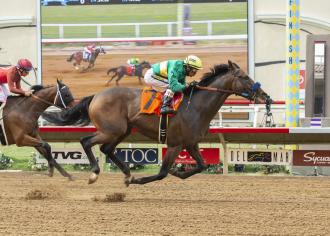
Parx would probably have to adopt similar policies planned for Maryland racetracks — that the backstretch would be closed to ship-ins from out-of-state, and possibly that only horses stabled at. Parx Casino and Racing (formerly Philadelphia Park Racetrack and Casino) is a thoroughbred horse racing venue and the largest casino gaming complex in Pennsylvania. Parx is located in Bensalem Township in Bucks County, northeast of the city of Philadelphia.
- Parx Casino and Racing (formerly Philadelphia Park Racetrack and Casino) is a Thoroughbred horse racing venue and the largest casino gaming complex in Pennsylvania.Parx is located in Bensalem Township in Bucks County, northeast of the city of Philadelphia.Owned and operated by Greenwood Gaming and Entertainment, Inc., Parx features 24-hour gaming with over 3,200 slot machines, 188 live.
- Jokers Picks offers you free horse racing picks to help you improve your handicapping skills and win. Have a look at the past results.
- Parx Casino is one of the few casinos to have an additional website to its casino site dedicated completely to horse racing. So for the complete rundown including the event schedule, Phonebet, race results, horsemen, and wagering information, visit the Parx Racing website.
Racing resumed this week at Parx Racing following three positive COVID-19 results last week. The track’s routine post-virus schedule is Monday and Tuesday. Racing also took place on Wednesday this week.

Training at the suburban Philadelphia track was suspended last Thursday and Friday in the wake of a positive result for jockey Anthony Salgado and two additional backside employees who’d been near the jockey.
Infected Parx jockey had five races last week
Salgado had run in five races on Aug. 11, meaning there was a fair amount of potential exposure.
Following virus testing and then sanitization of the jockey’s room, training had resumed Saturday.

Not much had changed at the Bucks County track by Monday as the first race since the virus was found the week before.
There were temp checks for everyone, gamblers, and workers alike. A mask was required to get in, though its use seemed unenforced, with many gamblers and a few track workers not following protocol. Enforcing such a protocol has obviously been a struggle for many venues and busines

Parx Casino Racing Results
Winners circle
On Monday the winner’s circle grip-and-grin photos and interviews took place in the paddock. Usually, that happens outside in front of the terrace facing the track.
The stated rationale for the move according to on Parx track employee is there are just six valets currently working as one of those who tested positive worked as a valet. A jockey’s valet saddles and unsaddles the rider’s horse.
But the changed location also accelerated the ceremonial process. That meant less extended close contact between track workers near the horses.
As one trainer with a horse that ran Monday observed:
“I think people are just living there lives and not focusing so much on the virus. Everywhere.”
Tough year for racing, not just at Parx
The year 2020 has been hard on racing everywhere, but with a twist in PA.
The year began with PA Gov. Tom Wolf proposing in February to divert more than $200 million annually away from racing purses and breeding programs despite the money being encumbered in a trust fund.
Wolf wanted to create a scholarship program for students at state universities with the money.
But he gained little political traction.
Parx Casino Horse Racing Schedule
COVID-19 closed the state’s six tracks
The virus soon diverted attention in March. That was when tracks and casinos – which fund horse racing with a ten percent cut from land-based casino slots – closed.
But even as other activities returned, Wolf repeatedly delayed reopening tracks. PA’s tracks were the last in the region to reopen.
Re-opening has not always been smooth
Due to non-compliant crowds, Meadows Casino Racetrack in Western PA has had to cut-off onsite wagering and fans on Saturdays.
Meanwhile, PA state agencies point fingers over responsibility for enforcing health protocols at tracks.
The virus disrupted the Triple Crown schedule.
The racing season at a Virginia trackended recently due to COVID among personnel.
The taxable handle generated by Pennsylvania’s six race tracks dropped by more than 10.7% in 2019 to around $300 million, according to a state report last week. That’s a decrease of more than $36.1 million from the previous year.
Parx Casino Racing Schedule
And at Parx both the Pennsylvania Derby and the Cotillion Stakes, two Grade I stakes races that featured $1 million purses, are off for the year.
Parx Horse Racing Results Today
Funding racing with casino slot revenue could again become an issue with more urgency in November.